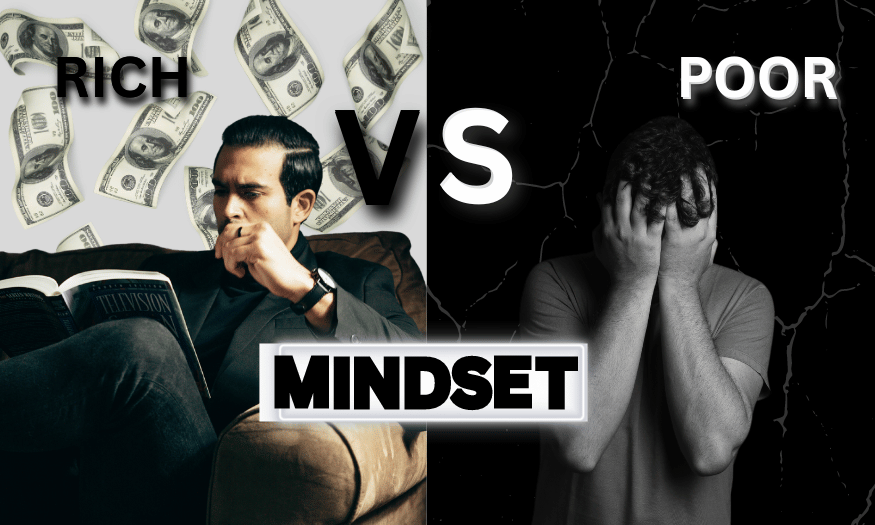Difference Between Rich and Poor Mindset

The Rich vs. Poor Mindset
How Thinking Shapes Success
Success is not just about resources,
opportunities, or circumstances; much of it is driven by mindset. The
difference between a "rich" and "poor" mindset goes on the
other side of material wealth and is fixed in our thinking patterns, attitudes,
and actions. Let's explore the key differences between these two mindsets and
how shifting one's thinking can unlock opportunities and drive success.
If you want to study about Rich VS Poor
mindset you can read a book:
Also available in Urdu
1. Growth vs. Fixed Mindset
A person with a "rich
mindset" keeps adopting a growth mindset, believing that abilities
and intelligence can be developed through hard work, learning, and
perseverance. They view challenges as opportunities for growth and learning.
This mindset helps them to earn money.
On the other hand, a fixed mindset—often associated with a "poor mindset"—believes intelligence
and talent are natural and unchangeable. This way of thinking leads to avoiding
challenges and giving up easily when faced with difficulties, limiting personal
and professional growth.
Rich Mindset: "I can always learn more and improve."
Poor Mindset: "I’m not smart enough for this."
2. Opportunity vs. Scarcity Thinking
The rich mindset is defined
by an abundance of thinking. Those with this mindset believe that the
world is full of opportunities, resources, and possibilities. They focus on
solutions, possibilities, and the belief that there’s enough for everyone. This
allows them to take risks, invest in new journeys, and give generously because
they trust in the potential for more.
While, the scarcity mindset limits potential by viewing life as a zero-sum game, where gains for one person
mean losses for another. This thinking leads to store resources, fearing
competition, and focusing on short-term gains rather than long-term
opportunities.
Rich Mindset: "There’s more than enough to go around."
Poor Mindset: "If they succeed, there’s less for me."
3. Long-Term Vision vs. Short-Term Gratification
Those with a rich mindset
think in the long term. They prioritize delayed satisfaction, understanding
that investments—whether in education, relationships, or finances—take time to
grow. They plan for the future, set goals, and make sacrifices in the present
to secure a better tomorrow.
In contrast, a poor mindset
often focuses on rapid comfort, hunting short-term rewards and quick fixes.
This thinking can lead to impulsive decisions, debt, and a lack of long-term
strategy, often at the expense of future stability.
Rich Mindset: "I’ll invest now for a better future."
Poor Mindset: "I want it now."
4. Responsibility vs. Blame
A critical characteristic of the rich
mindset is a sense of personal responsibility. People with this mindset
believe they are in control of their destiny. They take ownership of their
decisions, successes, and failures. If something goes wrong, they examine the
situation, learn from it, and retry.
The poor mindset, however,
often shifts blame. Rather than acknowledging their role in disappointments,
individuals may credit failure to external factors like luck or circumstances.
This lack of responsibility stunts growth and avoids the development of
problem-solving skills.
Rich Mindset: "I’m responsible for my outcomes."
Poor Mindset: "It’s not my fault things went wrong."
5. Learning vs. Entertainment
A rich mindset values learning
over entertainment. Individuals with this mindset invest time in
self-education, reading, and personal development. They understand that
knowledge is a key driver of success and actively seek ways to expand their
business and improve themselves.
Conversely, those with a poor
mindset may prioritize entertainment over growth. While relaxation and fun
are important (like excessive TV, social media, or video games) may take time
away from personal development and goal achievement.
Rich Mindset: "How can I learn more today?"
Poor Mindset: "I need to escape reality for a while."
6. Networking vs. Isolation
Success is rarely achieved in
isolation. The rich mindset places great value on building
relationships, networking, and collaboration. People with this mindset
understand the importance of learning from others, growing mutually beneficial
partnerships, and surrounding themselves with positive influences.
On the other hand, a poor mindset
often isolates. It may be driven by mistrust, jealousy, or the belief that
asking for help is a sign of weakness. This thinking limits access to new
opportunities, outlooks, and potential collaborations.
Rich Mindset: "Let’s work together to grow."
Poor Mindset: "I don’t need anyone’s help."
The Power of Mindset Shifts
The difference between a rich and
poor mindset doesn’t lie in how much money one has but rather in how one thinks
and approaches life. Shifting from a poor to a rich mindset can lead to
profound changes in your life, unlocking new opportunities and empowering you
to take control of your future.
Here are some steps to begin
shifting your mindset:
- Adopt a growth mindset: Believe that your abilities can be developed and that
failure is an opportunity to learn.
- Practice Appreciation:
Focus on the abundance in your life rather than what you lack.
- Set long-term goals:
Develop a vision for the future and take steps daily to work toward it.
- Take ownership:
Grab personal responsibility for your successes and failures.
- Invest in learning:
Commit to lifelong learning and self-improvement.
- Build meaningful relationships: Cultivate a strong support network and learn from
those around you.
Lastly
A rich mindset can transform not
just your financial success but also your overall quality of life. By embracing
abundance, growth, and personal responsibility, you can break free from
limiting beliefs and unlock a future filled with potential. Success starts with
how you think—shift your mindset, and you’ll shift your reality.


